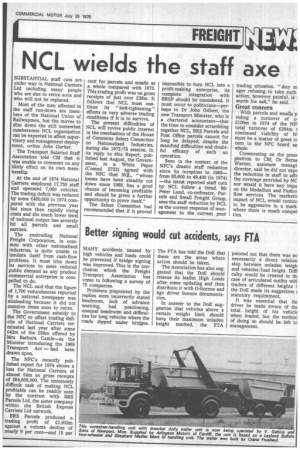NCL wields the staff axe
Page 21

If you've noticed an error in this article please click here to report it so we can fix it.
SUBSTANTIAL staff cuts are under way in National Carriers Ltd including many people who are due to retire soon and who will not be replaced.
Most of the men affected in the staff run-down are members of the National Union of Railwaymen, but the moves to slim down the still somewhat cumbersome NCL organisation can be expected to affect supervisory and management deployment, writes John Darker.
The Transport Salaried Staff Association told CM that it was unable to comment on any likely effect on its own membership.
At the end of 1974 National Carriers employed 17,750 staff and operated 7,060 vehicles. The trading deficit was reduced by some £400,000 in 1974 compared with the previous year but since then rapidly rising costs and the much lower level of national output has severely hit all parcels and small carriers.
The controlling National Freight Corporation, in common with other 'nationalised industries, is quite unable to insulate itself from cash-flow problems. It must trim down its services to meet reduced public demand as any prudent commercial enterprise is compelled to do.
The NCL said that the figure of 1,700 redundancies reported by a national newspaper was misleading because it did not mention those soon to retire.
The Government subsidy to the NFC to offset trading deficits of National Carriers terminated last year after some £42m of the £56m offered by Mrs Barbara Castle—as the Minister introducing the 1968 .Transport Act — had been drawn upon.
The NFC's recently published report for 1974 shows a loss for National Carriers of almost £4m on gross receipts of £64,805,000. The immensely difficult task of making NCL profitable can be readily seen by the contrast with BRS Parcels Ltd, the sister company within the British Express Carriers Ltd network. cent for parcels and smalls as a whole compared with 1973. This trading profit was on gross receipts of just over £36m. It follows that NCL must continue its "'belt-tightening " efforts in very adverse trading conditions if it is to survive.
The present difficulties of NCL will revive public interest in the conclusions of the House of Commons Select Committee on Nationalised Industries, during the 1972/73 session. In its reply to this Report, published last August, the Government, in a White Paper (Comnd. 5722) agreed with the NFC that NQ, "whose losses have been steadily cut down since 1969, has a good chance of becoming profitable and should be given a further opportunity to prove itself."
The Select Committee had recommended that if it proved impossible to turn NCL into a profit-making enterprise, its complete integration with BRSP should be considered. It muSt occur to politicians—perhaps to Dr John Gilbert, the new Transport Minister, who is a chartered accountant—that the time to consider scrambling together NCL, BRS Parcels and Post Office parcels cannot for long be delayed; despite the manifold difficulties 'and doubtful efficacy of such an Operation.
Seen in the context of the NFC's drastic staff reduction since its inception in 11969— from 65,600 to 49,400 (in 1974) —the latest reported staff cuts by NCL follow a trend. Mr Peter Land, co-ordinator, Parcels and Small Freight Group, sees the staff reduction by NCL as the correot response of management to the current poor trading -situation. "Any in ager refusing to take such action, however painful, is worth his salt," he said.
Great concern
With parcels and smalls p viding a turnover of o, £108m in 1974 of the NF1 total turnover of £264m continued viability of NI mast be a matter of great a cern to the NFC hoard as whole.
Commenting on the presE position to CM, Dr Berna Warner, 'assistant managi. director, said he did not expe the reduction in staff to affe the coverage provided by NC nor would it have any impa on the Medallion and Fashio flow services. The marketh impact of NCL would contint to be 'aggressive in a mark, where there is much compel tion.




































































































